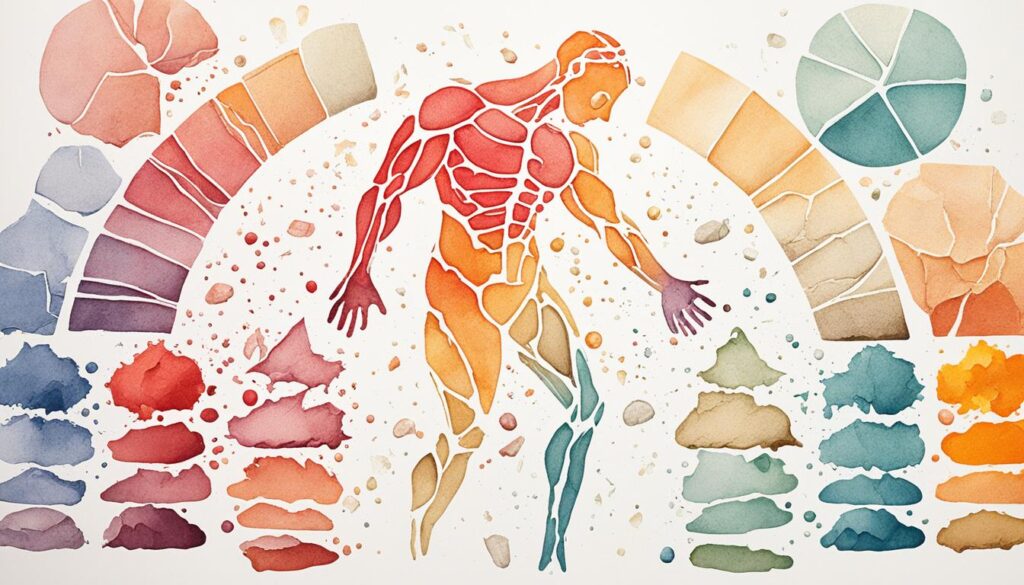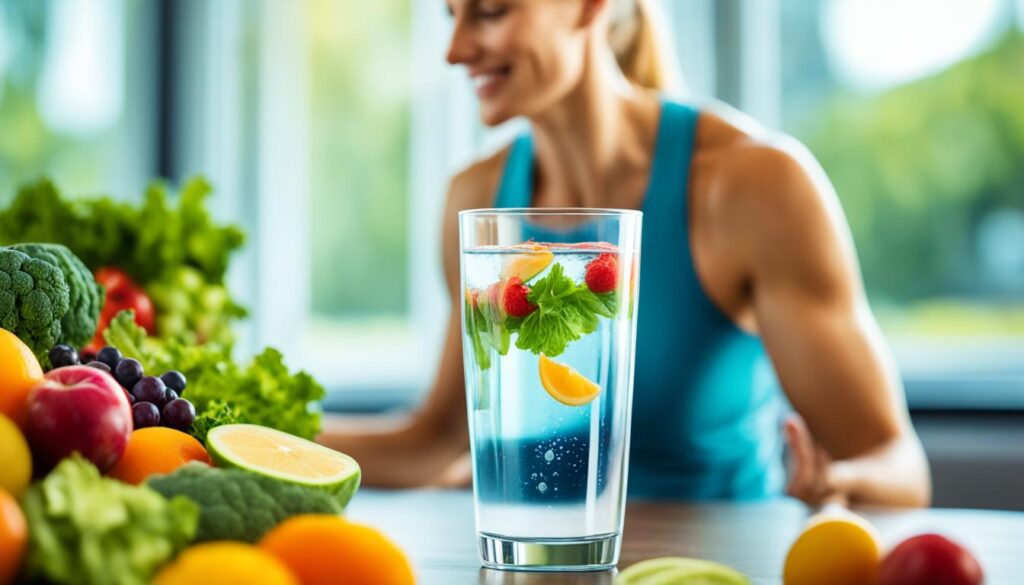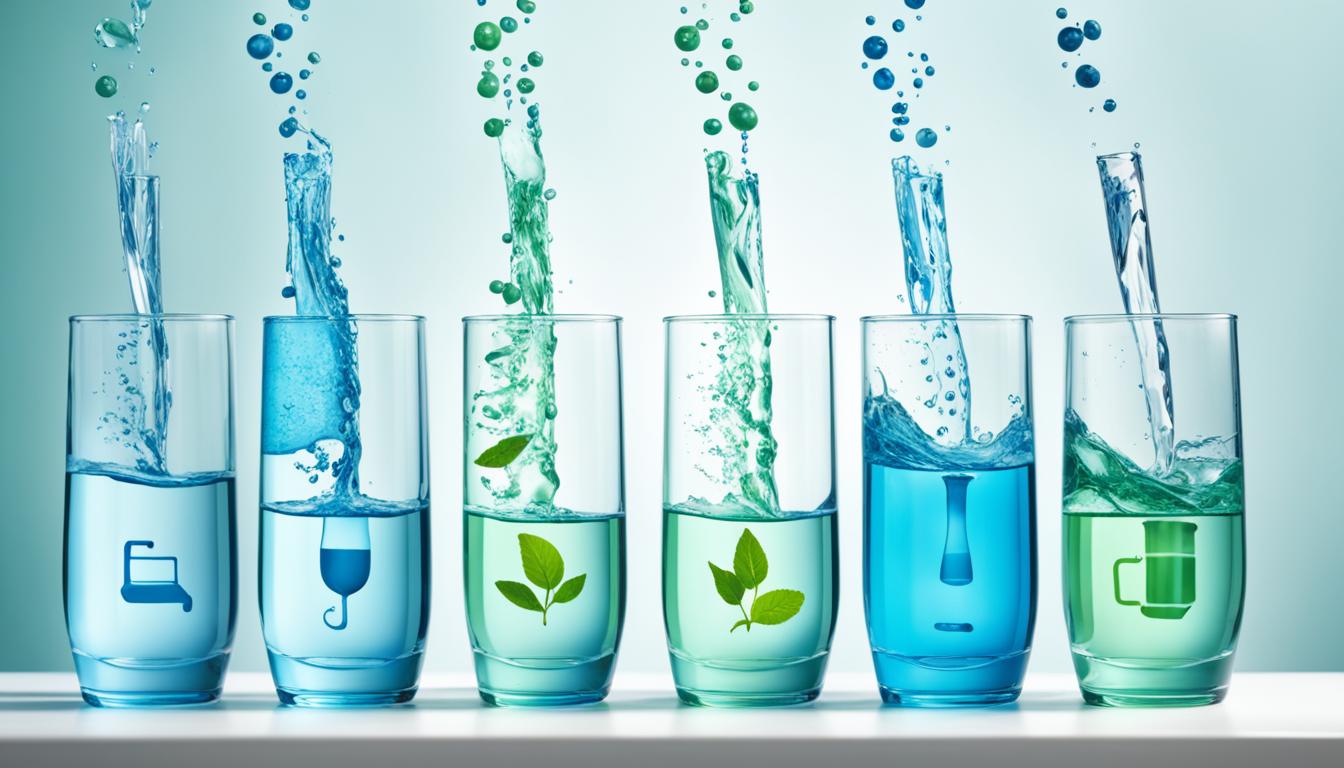More and more research shows how important water intake is for our health. Experts stress the need to understand when we’re hydrated enough. They also offer clear advice on how much water we should drink.
This knowledge is key for everyone, from sports stars looking to beat their best to those just wanting to feel good. So, the lessons from research are widely applicable.
Research points out that not getting enough water and choosing not to drink can both harm our health. The key message is simple: we need to drink enough water. This helps our bodies work well and boosts how well we burn calories.
The World Health Organization adds that clean water and good sanitation are vital for staying healthy.
Key Takeaways
- Water intake is vital for overall health and disease prevention.
- Proper hydration supports numerous physiological functions.
- Both involuntary dehydration and voluntary fluid consumption patterns affect health.
- The World Health Organization emphasizes the importance of accessible safe drinking water.
- Consistent water intake promotes metabolic efficiency and general well-being.
Importance of Drinking Water for Overall Health
Drinking water does more than just quench your thirst. It’s key for every part of our body to work well. Research shows water is vital for staying healthy at all ages.
Role of Water in Maintaining Bodily Functions
Water is critical for our body to function. It helps carry nutrients, keeps cells strong, and lubricates joints. The EFSA tells us water is crucial for our kidneys and to get rid of waste.
Immediate and Long-term Health Benefits of Hydration
Drinking water right away can make you feel better and keep your joints smooth. Long term, it helps your kidneys and keeps you healthy. Water stops urinary infections and keeps your brain sharp with age. The National Academy Press reminds us it’s important for our health and to prevent diseases.
Impact on Physical and Cognitive Performance
Being hydrated is great for your brain and how well you move. Drinking extra water at school helps kids think better. Athletes perform better and control temperature by drinking enough water. Hydration is important for our memory and mood.
| Population Group | Recommended Water Intake |
|---|---|
| Men | 13 cups (about 3 liters) per day |
| Women | 9 cups (just over 2 liters) per day |
| Pregnant Women | 10 cups per day |
| Breastfeeding Women | 12 cups per day |
| Kids and Teens | 6 to 8 cups per day |
Drinking enough water is crucial. It helps in so many ways, from moving nutrients to protecting our joints. Water keeps you thinking well and feeling good. Make sure to drink enough water to boost your life quality.
Effects of Dehydration on Health
Dehydration affects how we feel and function daily. It shows through many signs. It’s important to know these signs early to keep well and drink enough water.
Signs and Symptoms of Dehydration
The signs of dehydration include feeling tired, dizzy, and having a dry mouth. It can also make you not think clearly. As it gets worse, you might not be as strong, feel moody, and have trouble moving well. Older people often face these issues, as per the NHANES III. It found that many older folks don’t have enough water in their bodies, and they live in their own homes. Making sure you drink enough water is key for all, but it’s extra important for seniors and kids.
Studies on the Impact of Dehydration on Health
A lot of research has looked into what not drinking enough water does to our bodies and minds. One study, in the Acta Paediatr, discovered that when school kids didn’t drink water, it affected how they thought. This highlights the need for staying hydrated for wellness, especially when it’s hot. Another study focused on children’s thinking skills and how drinking extra water helps. This helps prove that staying hydrated improves thinking and moving for both older people in the U.S. and Germany.

| Study Focus | Demographic | Publication |
|---|---|---|
| Plasma Hypertonicity Prevalence | Community-dwelling older adults | NHANES III |
| Dehydration and Cognitive Function | Elementary school children | Acta Paediatr |
| Urine Osmolality Analysis | Children in hot climates | Ambulatory Child Health |
| Supplementary Water Benefits | Students | International Society for Developmental Psychobiology |
| Hydration Status | Community-dwelling older adults in the US and Germany | Nutr Rev |
Exploring the Research on Water Intake and Health
Research shows our health is closely tied to how much water we drink. Recent studies offer valuable info on how staying hydrated affects us.
Scientific Findings on Optimal Water Intake
Experts say the perfect amount of water is different for everyone. It depends on where you live, your body’s needs, and how you spend your days. Surprisingly, over half of adults in the U.S. and Germany don’t drink enough water.
Hydration is key for thinking and moving well. Older adults need to pay special attention to how much they drink. They should adjust their water habits to stay healthy.
Comparative Studies across Different Populations
When it comes to getting enough fluids, not every place is the same. Each country has its unique way of drinking water. The Institute of Medicine says we should set water goals that fit our group, like kids in school. More water at school can make young minds sharper.
Role of Hydration in Disease Prevention
Drinking enough water helps fight off sickness. It reduces your chances of getting kidney stones and colorectal cancer. A study from 2015 found that more water each day lowers kidney stone risks.
It’s key to remember that water is good for your mind too. It keeps your brain working well, especially as you get older.
Health Benefits of Proper Water Intake
Drinking enough water is key to good health. It helps our bodies work well, keeps our skin healthy, and can even help with losing weight. Let’s take a closer look at how water does all this.

Hydration and Metabolic Efficiency
Staying hydrated helps our body process food and turn it into energy. This speeds up our metabolism. A study found that when people drank more water, their metabolism got better. This also helped lower their blood pressure.
Looking at hydration levels, as Nutr Rev discussed in 2005, is important. It tells us if we’re getting enough fluid to stay healthy.
Skin Health and Hydration
If you drink enough water, your skin will thank you. It becomes more elastic and better hydrated. A 2008 study showed that staying hydrated even improves how well we think. This has a positive effect on our skin too, by keeping stress low.
So, remember, the look of our skin shows how well hydrated we are inside. Make sure you drink plenty of water for glowing skin.
Water Intake and Weight Management
Water is a great tool if you’re watching your weight. It helps you eat less by making you feel full. A study found that drinking more water for six weeks lowered certain chemicals in our blood. This was good for managing weight.
Another study from 2005 pointed out that many people aren’t drinking enough water. It warned that this can make it harder to control our weight.
| Benefits | Impacts |
|---|---|
| Metabolic Efficiency | Enhanced nutrient absorption, reduced blood pressure, effective waste elimination |
| Skin Health | Improved elasticity, hydration, reduced stress effects |
| Weight Management | Natural appetite suppression, better caloric control, decreased glucose concentration |
Practical Tips for Staying Hydrated
Making sure you drink enough water every day is key to staying healthy. It’s important to keep your body well hydrated. To do this, check the color of your urine. Darker urine means you might be dehydrated. On the other hand, if it’s light and clear, you’re likely okay.
Eating fruits like watermelon and cucumbers can help a lot. They’re full of water, vitamins, and minerals. This is especially important for older adults worried about their body fluid levels (Stookey JD). Fruit and veg add to your daily water intake and are good for you.
It’s also smart to make drinking water a daily habit. You can do this by using phone apps or setting reminders. Adding fruit to your water can also make it tastier. This way, you’re more likely to drink enough water every day.
Listen to your body by paying attention to when you’re thirsty. If you feel thirsty, drink water right away. Also, be aware of when you might lose more water, like when exercising. Understanding these signs helps you stay ahead of dehydration. It’s especially important in warm weather or when playing sports, where not drinking enough water can be risky (Bergeron MF et al.).
| Demographic | Prevalence | Impact |
|---|---|---|
| Older Adults | High plasma hypertonicity | Increased dehydration risks (Stookey JD) |
| Elementary School Children | High dehydration prevalence | Impacts cognitive functions (Bar-David Y et al.) |
| College Football Players | Dehydration concerns during preseason | Impaired performance and recovery (Godek SF et al.) |
| Youth Football Players | Risk of heat stress and injuries | High risk during exercise in heat (Bergeron MF et al.) |
These simple tips are great for everyone’s health. From eating foods with lots of water to watching for signs of thirst, they cover the essentials. More studies on water and health will keep giving us better ways to stay hydrated. This helps with physical and mental performance.
Conclusion
Drinking enough water is really important for our health, both now and in the long run. It keeps our body works smoothly, our minds sharp, and our mood up. It’s super important for older adults, too, as their bodies tend to need more water to stay well. %
Water is crucial for everyone, no matter their age. Kids need it to think better, while seniors use it to keep their heart and body temperatures in check. What’s interesting is how water intake varies around the world. This reflects different cultures and habits.
Staying hydrated is key to keeping away sickness and issues like heart disease. Not drinking enough water can make you feel tired and mess with how your brain works. Knowing how much water you need and drinking it daily can really improve your life. More and more studies say we should all be drinking plenty of water.%




